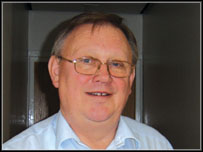NEW CENTURY NEWS MAKER
26 Jan 2005
 Andy Milne talks to Per Staehr, doyen of the railway engineering industry and Chairman of the Rail Media Group.
Andy Milne talks to Per Staehr, doyen of the railway engineering industry and Chairman of the Rail Media Group.
Rail Media Group, publishers of RailStaff and Rail Engineer, has appointed Per Staehr as Chairman. Per is perhaps best known for his work in the British rolling stock industry first as CEO, Adtranz UK and then as Chairman and Chief Country Representative of Bombardier Transportation UK after the Canadian combine acquired Adtranz in May 2001.
He was Chairman of RIA (Rail Industry Association) and Chairman of Derby and Derbyshire Rail Forum until he stepped down at the end of June this year. He has been through railway privatisation from the outset retaining much of the wisdom gained during the crucial early years of the new rail industry.
What have you been up to since leaving Bombardier last June?
I am still a director of Arrow Light Rail representing the Bombardier interests in the ‘Nottingham Tram Concession Company’ Furthermore, I am working within the international rail industry as an advisor on privatisation and major projects.
Also, I have been Chairman of A2SEA since 2001, a Danish based company pioneering installation of offshore wind turbines. Formed in year 2000 this company was Danish winner of the category ‘Emerging companies 2002’ and last year installed the Scroby Sands wind farm off Lowestoft. A2SEA has just opened office in Derby and been awarded the contract for Kentish Flats which will be the UK’s largest offshore wind farm to date when completed in 2005.
Railways are a comparatively recent career for you. What is your underlying trade?
‘I’m an engineer by trade. After serving an engineering apprenticeship at Frederikssund at Roskilde Fjord in Denmark – where I come from – I went to sea. I joined the Danish Royal Navy and later graduated from the Naval College,’ says Per. In fact Per was later commissioned as a Chief Engineering Officer serving in the submarine squadron with the NATO Standing Naval Forces Atlantic.
‘I left the Royal Navy and joined A. P. Moller Copenhagen, the Danish merchant shipping giant which we know here as Maersk Shipping. In 1979 Per moved to London picking up his directorship in Maersk a year later in 1980. With a small team he set about building up Maersk’s shipping presence in the UK and in addition became involved in maintenance of offshore oil installations.
“It was in developing Maersk’s offshore capabilities that the team thought out the turn key concept for drilling, producing and shipping oil and gas e.g. “One Contact – One contract”. The system proved a great success adding real value to major oil companies, so when offered the post of Chief Executive of Adtranz I set out to prove how far we could progress something similar in the new rail industry.
Looking back do you think British railway privatisation was bungled?
“With hindsight things could have been done differently but the industry has turned a corner, there’s no doubt that performance is improving, rail is carrying increasing number of passengers and major new investments are being seriously considered. The success part of the privatisation story is seldom told. However I accept privatisation has been tough for all parties within the industry. Many expensive lessons have been learned.
Do you view the railways Bill – currently before the House of Commons as advantageous for rail?
“Firstly the bill has been issued following extensive consultation within the industry. By listening and including a number of industry recommendations in the new Bill our Government has shown that it is serious about our railway. The outstanding issue is for the Government to recognise railways including its supply chain as being of strategic importance – like the Japanese, the German and the French have.
The Act does point to a simplification of structure which is a good start. Network Rail has already achieved a great deal. The great unknown is however whether the government, or should I say the nation, can actually afford to invest the required capital in building a first rate railway.”
Engineering always seemed to be the poor relation in contrast to the razzmatazz of the train companies. Why is that?
“On the surface that seems to be the way it is. However the changes in how our railways operate and perform are being driven by engineers – new projects, infrastructure renewal, and new rolling stock are great achievements and are a tribute to the collective hard work and ingenuity of the railway engineering community.”
Why did you agree to become chairman of the Rail Media Group?
“I support the philosophy behind RailStaff and Rail Engineer and their online site www.railwaypeople.com, that there is a great deal of good news to be shared. Railway people working on the track or building new rail vehicles have for some years been fed a diet of bad news stories about their industry from a sometimes biased and unobjective popular press. My loyalty is to the people who configure and work within the industry and I want to encourage them to deliver a railway we can all be proud of.”
You are a Director of the Nottingham Tram Concession Company. Do you see a bright future for trams in the UK ?
“Provided the industry can get costs down there is no reason why we should not see more tram schemes being built in the bigger cities.”
And how would you get costs down?
“By standardising contractual arrangements, vehicles and infrastructure design; e.g. increased volumes based on proven concepts, technology and operating practices will reduce building and operating costs.”
Do you have a final comment?
“I would like to wish all our readers and colleagues in our industry the very best for the New Year, and let us all strive to make the railway the means of transport by choice.”
Per can be contacted on: per@railmediagroup.com
